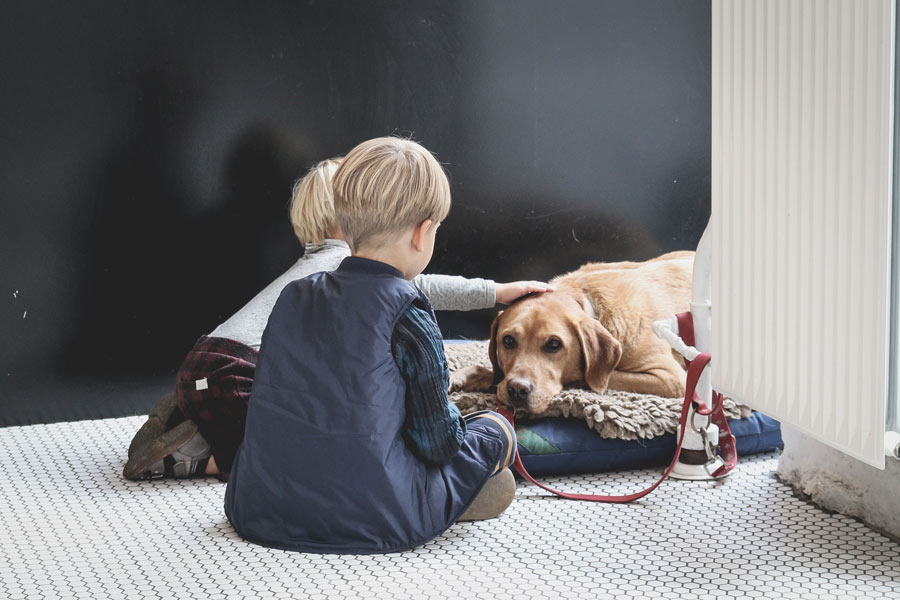Sure, dogs are recognised as being ‘man’s best friend’, but our canine chums can also bring a whole host of benefits to kids too.
In honour of National Kids and Pets Day, we’re taking a look at the myriad benefits of pet ownership for the littlies.
As adults, we recognise that taking time out (even just a few minutes) to stroke our cat or pat our dog can help reduce our stress levels and increase our ‘happy hormones’. However, it’s also good to know (and share) the positive impact that pets can have on children.
National Kids and Pets Day is an ideal opportunity for pet professionals to highlight the benefits that pet ownership brings to kids. You could say it’s the ‘pawfect’ way to celebrate the positivity that pets bring to all facets of life.
The benefits of growing up with furry friends
As a parent, even if it hasn’t yet happened yet, you can expect your child to plead for a pet at some point. It’s practically a given! Whether it’s a cat, a dog, a guinea pig or even a snake – every child wants a pet.
Of course, as sensible adults, we weigh up the costs and obligations that come with owning a pet. However, all kids think about is how much fun they’ll have with their furry (or scaly) new friend!
Nonetheless, many studies have confirmed that owning a pet (more so a dog) can bring many benefits for children. So, if you know someone who is considering bringing a pet into their family, why not share some of the positives that come with owning a pet.
Pets protect against allergies
Numerous studies have shown that keeping pets can help protect kids against allergies. One Swedish study revealed that keeping one or more dogs or cats during the first year of a child’s life could protect against asthma, hay fever and eczema.
It is thought that early contact with pets gives greater exposure to different microbes and bacteria. This is a good thing because it can train the immune system.
Pets help with social learning
Aside from the fact that our furry friends provide unconditional love, pets are also thought to play a vital role in kids’ social and emotional development.
A survey of more than 1,000 seven to 12-year-olds in Scotland, UK, found that childhood pet attachment promotes reduced aggression, greater wellbeing and improved quality of life for kids.
It revealed that children who were emotionally attached to their pets (as most children are) exhibited more caring and compassionate attributes.
Pet can aid cognitive performance
Studies have shown kids read more confidently and competently in the presence of a dog, rather than a supportive human. One study that looked at dog interactions on reading ability in children aged six to eight years found that kids showed significant reading improvements in conditions where a dog was present.
It’s believed that dogs’ non-judgemental nature boosts kids’ confidence leading to improved reading fluency, accuracy and comprehension.
Promoting positive relationships between kids and pets
National Kids and Pets Day occurs annually on April 26th. It’s a perfect time to celebrate the amazing bond between children and our furry friends. However, it’s also an opportunity to promote positive relationships between kids and pets.
If you know someone who is considering getting a pet for their child, remind them of the following points when it comes to pet care.
- Children under the age of four should be monitored when they are with pets. This is because they may be less able to control aggression or anger.
- An adult should always oversee the care of a pet. Even if they believe their child is mature and old enough to take responsibility.
- Children should be reminded of the fact that pets need basic care, just like people. This includes clean water daily, food and exercise.
- Parents can be role models for their kids and help to teach youngsters responsible pet ownership.
There’s no denying that in the right circumstances pets can be a wonderful addition to the family and can bring many benefits to both children and adults.
What are some of the key benefits you get from your pet?
Information sources:
- Hesselmar, B et al. Pet-keeping in early life reduces the risk of allergy in a dose-dependent fashion. Plos One. December 19,2018. Accessed online April 2020.
- Hawkins, Roxanne D et al. “Childhood Attachment to Pets: Associations between Pet Attachment, Attitudes to Animals, Compassion, and Humane Behaviour.” International journal of environmental research and public health vol. 14,5 490. 6 May. 2017
- Connell, C et al. Dogs in schools: The impact of specific human-dog interactions on reading ability in children aged 6 to 8 years. A multidisciplinary journal of the interactions of people and animals. Volume 32, P 347-360. 2019.
- Pets and children. The American Academy of Child and Adolescent Psychiatry. January 2019. Accessed online April 2020.
Image source: Unsplash
Latest posts by Liz Walden (see all)
- Pet health: Medicinal cannabis for pets - December 27, 2021
- What pet business insurance do I need? - November 17, 2021
- Pet sitters: how to take time off - November 15, 2021










Leave A Comment